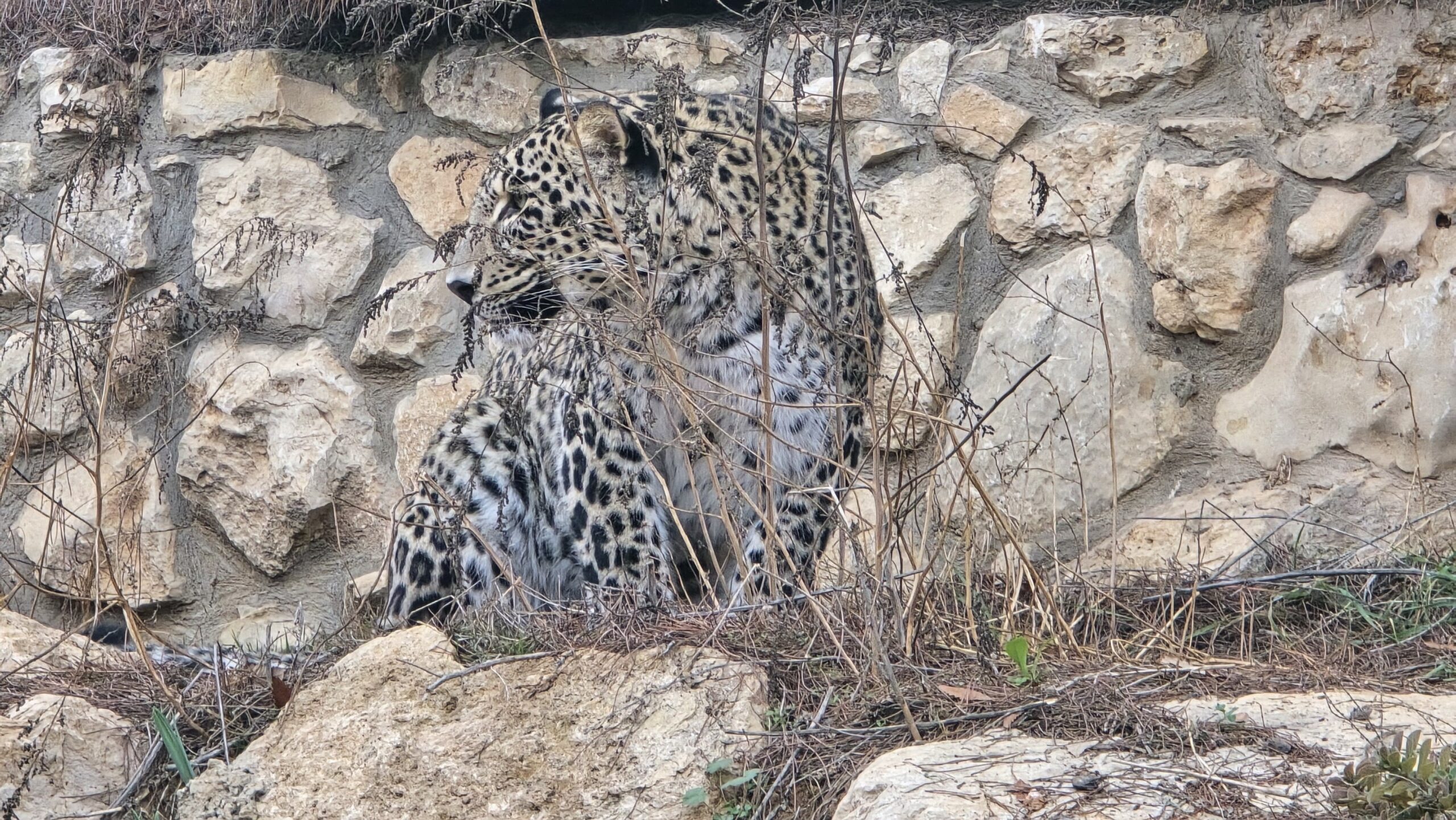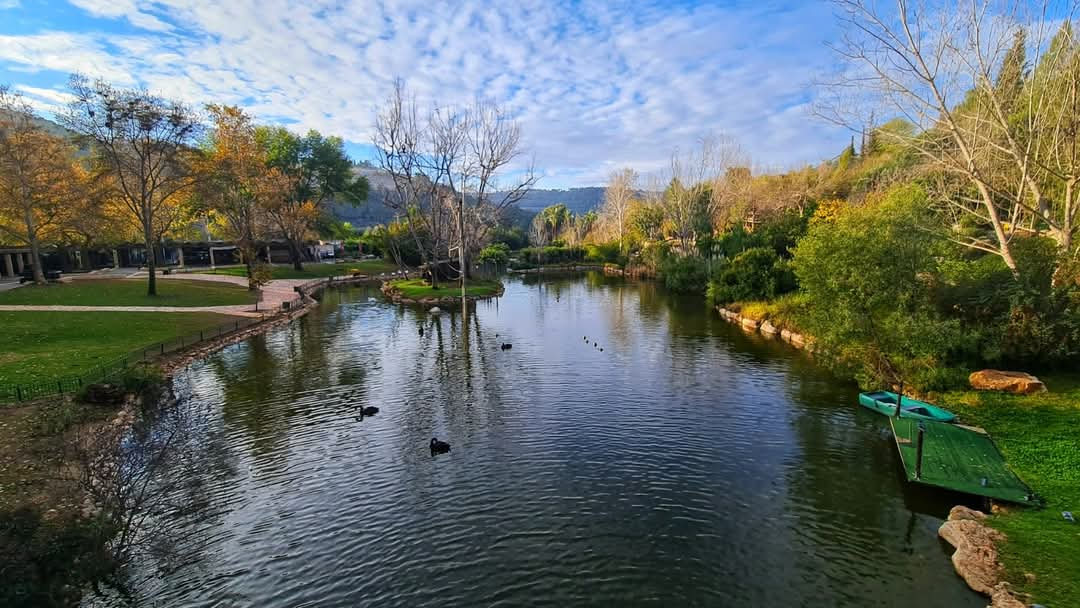After months of challenges related to the multifront war in Israel, Jerusalem’s Tisch Family Biblical Zoo marked a milestone last month when it welcomed two rare Persian leopards. Initially scheduled to arrive in July 2024, the Persian leopards were stranded for months in the Czech Republic after Lufthansa Airlines suspended wildlife transport flights to Israel amid the war. Israel’s national El Al airlines then stepped in to transport the animals to Jerusalem.
The animals’ arrival represents a major success for the biblical zoo, which has endeavored to provide Israelis with a haven of hope and tranquility among the chaos of war. Now, Israelis and visitors will now be able to see the leopards, some of only 1,500 or so of their species left in the world.
The two leopards are brothers, each about 2.5 years old. Nili Avni-Magen, zoological director and head veterinarian of the zoo, told The Media Line that the leopards are part of a global breeding program. “This subspecies is almost extinct in the wild, with only a few left in northern Iran and parts of Russia,” Avni-Magen said. “Their arrival is a big step for conservation, and visitors are already meeting them and learning about their story.”

Nili Avni-Magen, zoological director and head veterinarian of the Tisch Family Biblical Zoo in Jerusalem. (Courtesy of the Tisch Family Biblical Zoo)
Persian leopards are one of the largest subspecies of leopards, growing up to 6 feet in body length, with tails reaching 3.5 feet, and weighing as much as 200 pounds.
The brothers join more than 170 other species held at the biblical zoo, which is dedicated to preserving species mentioned in the Hebrew Bible. The zoo, which welcomes visitors from diverse communities across Israel and beyond, has managed to provide a unique space of peace and connection throughout the conflict.
Sigalit Hertz-Dvir, director general of the zoo, told The Media Line about the leopards’ harrowing journey. After months of waiting in the Czech Republic’s Dvůr Králové Zoo, the leopards were eventually brought to Frankfurt to be taken to Israel on an El Al flight, she said. She described that trip as “a long day” for the leopards.

Sigalit Hertz-Dvir, director general of the zoo. (Courtesy of the Tisch Family Biblical Zoo)
The Israeli zoo team was eager to welcome the leopards, despite the high costs and logistical challenges of their arrival. But on the night of their arrival, the leopards were greeted by an attack on Israel. “We lift our heads and look at the sky, and we see a fireball flowing over our heads, and then we start to hear the booming,” Hertz-Dvir recounted.
It was such a strange and symbolic moment—these leopards coming from peaceful Europe to a war zone
The unsettling juxtaposition of the leopards’ peaceful arrival against the backdrop of conflict left a lasting impression on the team. “It was such a strange and symbolic moment—these leopards coming from peaceful Europe to a war zone,” Avni-Magen said.
This holiday season, give to:
Truth and understanding
The Media Line's intrepid correspondents are in Israel, Gaza, Lebanon, Syria and Pakistan providing first-person reporting.
They all said they cover it.
We see it.
We report with just one agenda: the truth.



One of the Persian leopards in the zoo. (Courtesy of the Tisch Family Biblical Zoo)
It wasn’t the first time the reality of the conflict has hit home for the zoo community. Sagui Dekel-Chen, a joint US-Israeli citizen held captive in Gaza, is the brother-in-law of one of the zoo’s staff members.
“He’s a father of three young children, and his family is waiting desperately for his return,” Hertz-Dvir said. “He’s now on the list of 33 people expected to be released, and we’re all hoping and praying that he’s safe and will come home soon.”
Many other zoo workers have been called up to serve in the military reserves. Hertz-Dvir said that some employees spent only about one month out of the last year actually working because of their reserve service.
Avni-Magen said that working with animals and nature “has been therapeutic for everyone” throughout the war.
Hertz-Dvir said that the biblical zoo aims to be a haven for humans as well as animals. “Our most important duty or role is actually to keep a kind of tranquil and quiet and peaceful place for all the visitors,” she said. “And since the zoo is located in Jerusalem, we have many Arabs and Jews visiting the zoo, of course, ultra-Orthodox Jews. So our visitors are very, very varied.”
Everywhere you go, people are mixed, and it’s a good feeling that it still is possible
From her office, Hertz-Dvir has a view of the zoo’s main lake, a scene that she calls “the most optimistic window in Jerusalem.” “When I look outside, I see Arab women sitting with their children. And I see a few ultra-Orthodox Jews and their kids playing, and they’re running after the dogs, or they go to see the monkeys, and they all stand together,” she said. “Everywhere you go, people are mixed, and it’s a good feeling that it still is possible.”

The lake at the Tisch Family Biblical Zoo. (Courtesy of the Tisch Family Biblical Zoo)
Despite the challenges, the zoo has provided a sense of hope and normalcy for both visitors and staff. “Even during the war, the zoo remained an island of peace. People from all parts of society come here and feel safe,” Avni-Magen, who has worked for the zoo for over 25 years, said. “We see visitors connecting through animals and nature, and it gives us hope for the region and the Middle East.”
The war took its heaviest toll on smaller zoos located in conflict zones, Ori Linial, head of the Israel Nature and Parks Authority’s captive wildlife unit, told The Media Line. “There were a few very small zoos where we had to evacuate all the animals because people left or due to terrorist activity,” Linial explained. Larger zoos like the biblical zoo stepped in to provide shelter and care, he said.
Another challenge of running a zoo during wartime is the stress experienced by animals during missile attacks, Linial said. He recounted an incident during a previous conflict in Israel where a missile hit a safari zoo, breaking the fence of an enclosure.
“Animals are as stressed as humans, I guess, or even more,” Linial said. “As a regulator, we give zoos a few rules, like making safe places for the animals. But if a particular animal is scared more than others, it’s the zoo itself that deals with it.”
During this conflict, the biblical zoo took various precautions, and the animals were mostly unaffected by the sirens and alarms. “In the beginning, we closed the animals indoors, especially the dangerous ones, as a precaution against missiles,” Avni-Magen said.
At the start of the war, the zoo also closed its doors to visitors and later strictly limited entry in response to Israeli regulations about gatherings outside of protected areas. When evacuated Israelis were brought to Jerusalem hotels, many of them started visiting the zoo in search of a moment of peace. “We organized special programs for them, offering them a chance to relax in a green, peaceful environment,” Hertz-Dvir said.
After the zoo reopened its doors to the public, the number of visitors actually increased 5% over the previous year. Hertz-Dvir said that some of that increase was the result of other destinations becoming less accessible.
“People couldn’t go to the north, they couldn’t go to the south, and they couldn’t go abroad because there were hardly any flights,” she said. “People were looking for some safe and quiet places, so they came here.” The zoo provided special activities, workshops, and guided tours for Israelis seeking refuge from the chaos of war.
This place gives some optimistic thoughts. It gives hope. We must keep on this way.
For visitors and workers alike, the zoo has provided a unique form of solace, Hertz-Dvir said. “I think we are lucky to have this place, because it was such a terrible and sad year,” she said. “This place gives some optimistic thoughts. It gives hope. We must keep on this way.”